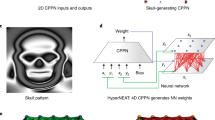
Overview
Provides a friendly step-by-step guide on the construction of Topology and Weight Evolving Artificial Neural Network systems from start to finish
Covers novel material for using Erlang in the construction of TWEANN systems
Explains why Neural Network based Computational Intelligence systems map perfectly to Erlang’s architecture, and the importance of this programming language to the future of computational intelligence
Introduces new TWEANN algorithms, with the final result being a concurrent, cutting edge, direct and indirect encoded, plasticity enabled, TWEANN platform
Buy print copy
About this book
Similar content being viewed by others
Keywords
Table of contents (20 chapters)
-
Front Matter
-
Neuroevolution: Taking the First Step
-
Front Matter
-
-
A Case Study
-
Front Matter
-
-
Advanced Neuroevolution: Creating the Cutting Edge
-
Front Matter
-
Authors and Affiliations
Bibliographic Information
Book Title: Handbook of Neuroevolution Through Erlang
Authors: Gene I. Sher
DOI: https://doi.org/10.1007/978-1-4614-4463-3
Publisher: Springer New York, NY
eBook Packages: Computer Science, Computer Science (R0)
Copyright Information: Springer Science+Business Media New York 2013
Hardcover ISBN: 978-1-4614-4462-6Published: 06 November 2012
Softcover ISBN: 978-1-4939-4588-7Published: 23 August 2016
eBook ISBN: 978-1-4614-4463-3Published: 06 November 2012
Edition Number: 1
Number of Pages: XX, 831
Number of Illustrations: 172 b/w illustrations
Topics: Software Engineering/Programming and Operating Systems, Artificial Intelligence, Computational Biology/Bioinformatics



